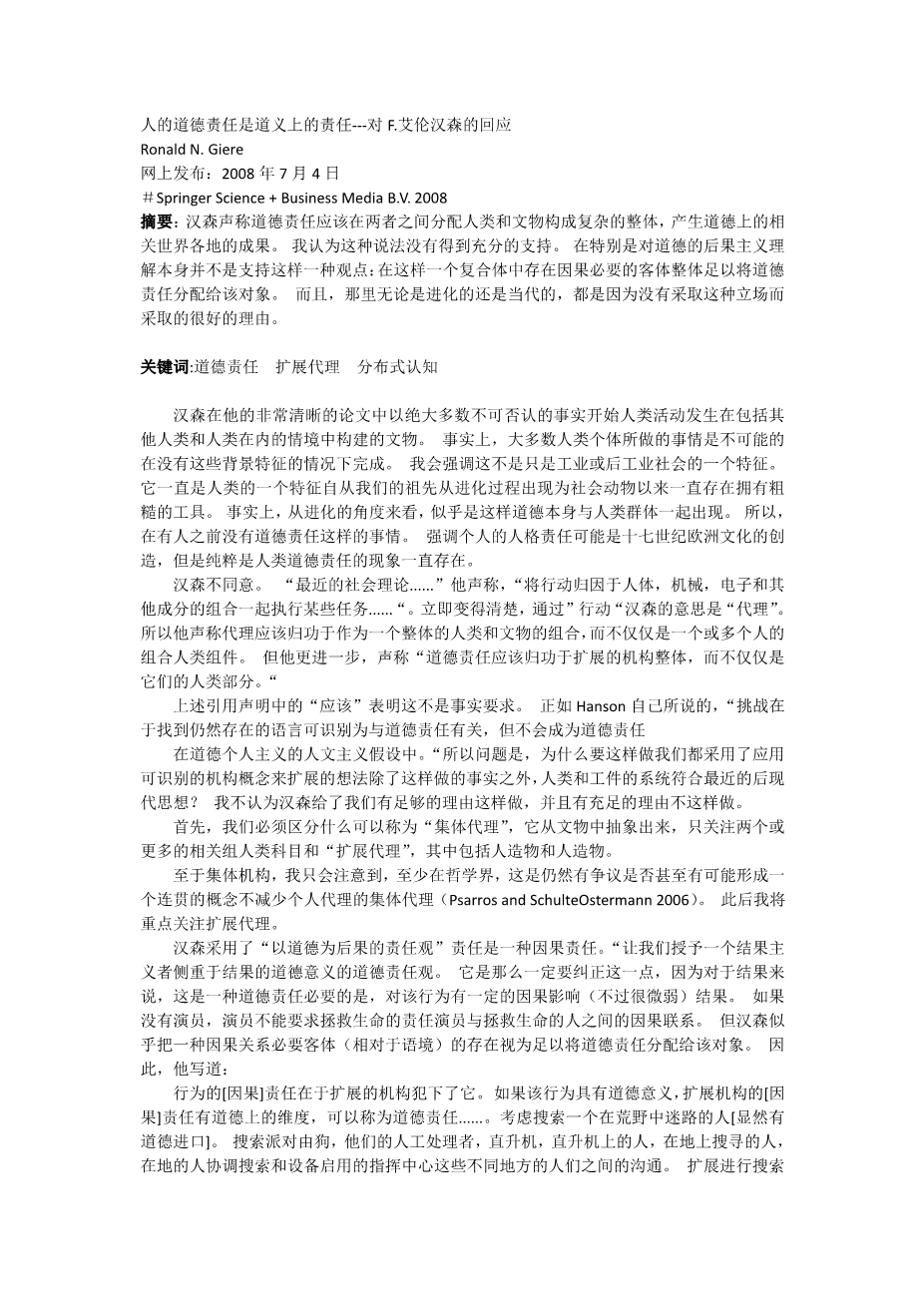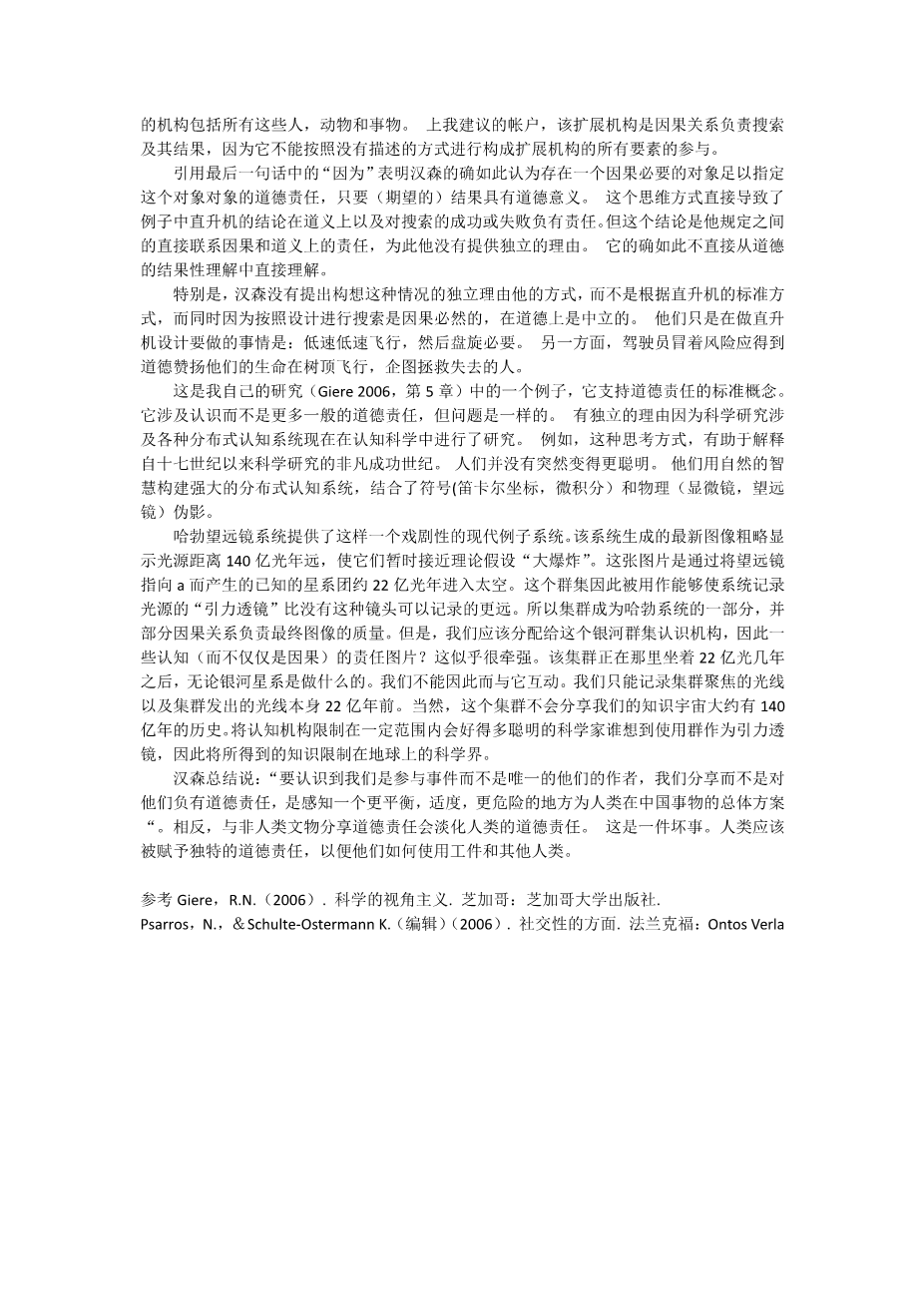Human moral responsibility is moral responsibility enough: A reply to F. Allan Hanson
Ronald N. Giere
Published online: 4 July 2008
# Springer Science Business Media B.V. 2008
Abstract Hanson claims that moral responsibility should be distributed among both
the humans and artifacts comprising complex wholes that produce morally relevant
outcomes in the world. I argue that this claim is not sufficiently supported. In
particular, adopting a consequentialist understanding of morality does not by itself
support the view that the existence of a causally necessary object in such a complex
whole is sufficient for assigning moral responsibility to that object. Moreover, there
are good reasons, both evolutionary and contemporary, for not adopting this stance.
Keywords Moralresponsibility . Extendedagency . Distributedcognition
In his admirably clear paper, Hanson begins with the undeniable fact that most
human activities take place in a context including other humans and humanly
constructed artifacts. Indeed, most things that individual humans do could not be
done in the absence of these contextual features. I would emphasize that this is not
just a feature of industrial, or post-industrial, society. It has been a feature of human
life ever since our ancestors emerged from the evolutionary process as social animals
possessing crude tools. Indeed, from an evolutionary perspective, it seems that
morality itself emerged along with human groups. So, before there were humans
there was no such thing as moral responsibility. An emphasis on individual human
responsibility may be a creation of seventeenth century European culture, but the
phenomenon of exclusively human moral responsibility has been there all along.
Hanson disagrees. “[M]uch recent social theory…” he claims, “attributes action to
combinations of human, mechanical, electronic, and other ingredients that come
together to perform certain tasks ….” As becomes immediately clear, by “action”
Hanson means “agency.” So he is claiming that agency should be attributed to
combinations of humans and artifacts as a whole, and not just to one or more of the
Phenom Cogn Sci (2008) 7:425–427
DOI 10.1007/s11097-008-9095-1
R. N. Giere (*)
Center for Philosophy of Science, University of Minnesota, Minneapolis, MN, USA
e-mail: giere@umn.edu
human components. But he goes even further, claiming that “moral responsibility
should be attributed to extended agencies as wholes, and not just to their human parts.”
The “should” in the above quoted statement indicates that this is not a factual
claim. As Hanson himself puts it, “the challenge is to find language that is still
recognizable as pertinent to moral responsibility but that does not become ensnared
in the humanistic assumptions of moral individualism.” So the issue is, why should
we all adopt the idea of applying a recognizable notion of agency to extended
systems of humans and artifacts—apart from the fact that doing so would be in
accord with much recent post-modern thought? I don’t think that Hanson has given
us adequate reasons to do so, and there are good reasons not to do so.
First we must distinguish between what might be called “collective agency,”
which abstracts from the artifacts and focuses only on a related group of two or more
human subjects, and “extended agency,” which includes artifacts as well as humans.
As for collective agency, I will only note that, in philosophical circles at least, it is
still controversial whether it is even possible to fashion a coherent notion of
collective agency that does not reduce to individual agency (Psarros and Schulte-
Ostermann 2006). Henceforth I will focus on extended agency.
Hanson adopts “a consequentialist view of responsibility that takes moral
responsibility to be a species of causal responsibility.” Let us grant a consequentialist
viewofmoralresponsibilitythatfocusesonthemoralsignificanceoftheoutcome.Itis
then surely correct that, for there to be moral responsibility for an outcome, it is
necessary that there be some causal influence (however tenuous) of the action on the
outcome. An actor could not claim responsibility for saving a life if there were no
causal connection between the actor and the person whose life was saved. But Hanson
seems to treat the existence of a causally necessary object (relative to context) as
sufficient for assigning moral responsibility to that object. Thus, he writes:
The [causal] responsibility for an act lies with the extended agency that
perpetrated it. If the act has moral import, the extended agency’s [causal]
responsibility has a moral dimension that can be called moral responsibility….
Consider a search for someone who is lost in a wilderness [which clearly has
moral import]. The search party consists of dogs, their human handlers,
helicopters, people in the helicopters, people searching on the ground, people in
a command center that coordinates the search, and equipment enabling
communication between the people in these different places. The extended
agency conducting the search includes all these people, animals, and things. On
the account I am proposing, that extended agency is causally responsible for the
search and its outcome, because it could not be conducted as described without
the participation of all of the elements that make up the extended agency.
The “because” in the last sentence quoted indicates that Hanson does indeed
regard the existence of a causally necessary object as sufficient for assigning that
object moral responsibility, so long as the (desired) outcom
剩余内容已隐藏,支付完成后下载完整资料


英语译文共 2 页,剩余内容已隐藏,支付完成后下载完整资料
资料编号:[478849],资料为PDF文档或Word文档,PDF文档可免费转换为Word


